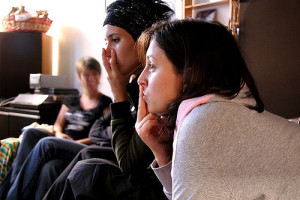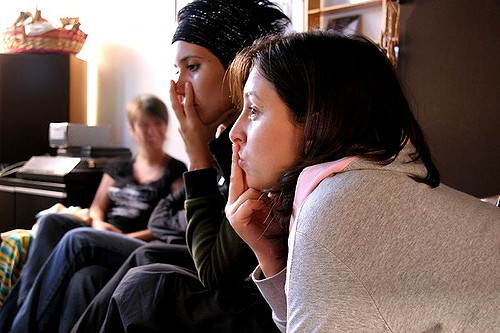>> More than half of Americans are reporting high levels of anxiety and stress related to the 2016 election season, according to a >>survey done by the American Psychological Association. And that was in mid-October. Now, on Election Day, if that number has moved at all, it has increased.
More than half of Americans are reporting high levels of anxiety and stress related to the 2016 election season, according to a >>survey done by the American Psychological Association. And that was in mid-October. Now, on Election Day, if that number has moved at all, it has increased.
My social media feed has been inundated with nothing but election-related news, both from “friends” and from sponsored ads. The sheer volume is enough to trigger anxiety. What am I supposed to do with all of this information? I can only vote once, and I already did it. Now there is just the waiting. What are we to do with all of this noise? No wonder we are all feeling anxious.
Mental health practitioners across the country, in an informal poll done by the >>New York Times , suggest that the dominating theme is this: “this election has made people feel less safe. ” The issues of the election—terrorism, fear of deportation, sexual assault, national security, hacking, allegations of election fraud—play on people’s fears and trigger deep-seated anxieties. Democrats and Republicans alike report high levels of anxiety, according to the APA survey; no one is immune.
In light of this, Women AdvaNCe offers tips from Shelley Danser, LCSW, to help us all attend to our own mental health needs this Election Day.
1) Turn down the sound or disconnect altogether. The APA recommends listening to just enough to keep you feeling informed, and then turning it off
2) Do something active: walk/jog, yoga, bike ride
3) Choose a soothing/grounding mantra: Stay calm; carry on…use this when you notice negative or worrisome thoughts
4) Try mindfulness: of breath or something soothing in your environment: candle, music, aromatherapy
5) Use metta or loving kindness mantras: May I be happy, healthy, peaceful, safe, at ease: first apply this to yourself, then your loved ones, then a difficult person in your life, and finally to our country or the world at large…
6) Remember that we often “spin stories in our mind” when we’re scared and they often/usually don’t play out exactly that way or at all. Reality is constantly changing, so there is hope even with an unpreferred election result that reality will be different than expected
Danser offers two final pieces of advice. First, if stress/anxiety/fear doesn’t ease after Election Day, please seek out a mental health provider who uses either/and/or Cognitive Behavioral Therapy or mindfulness or find a MBSR (Mindfulness Based Stress Reduction) class. Second, another way to help decrease distress is to become a “helper.” Mister Rogers said his mother taught him to respond to scary news by telling him “look for the helpers.” Consider becoming “a helper” yourself. Taking action and becoming involved with a community could decrease distress.
Finally, if the APA study tells us anything, it tells us that we are not alone. This election is unprecedented in its divisiveness and the animosity on both sides of campaigns, and has been ratcheting up levels of stress and anxiety on a nationwide and even a global scale. Once today is over, it is up to us all to take a moment to breathe in, breathe out, and ask the universe for the strength that we will need to help this country heal.
Oh, and instead of turning on the news, may I suggest some YouTube videos of a >>kitten and a dog who are best friends?

There are no comments
Add yours